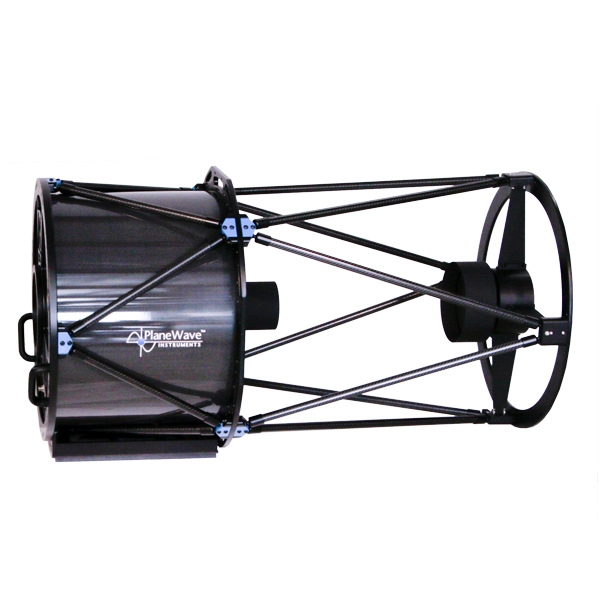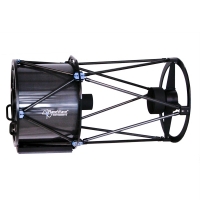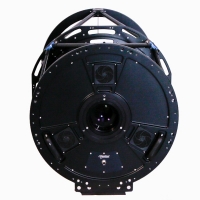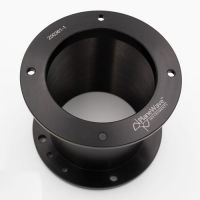PlaneWave CDK20 Telescope (f/7.77)
Starting Price: $39,000.00
Price as Configured: $39,000.00
Price as Configured: $39,000.00
Brand: PlaneWave Instruments / SKU: PW-200127Q
The CDK20 f/7.77 from PlaneWave Instruments stands as a pinnacle of engineering excellence, tailored for serious astrophotographers and astronomers who demand precision and performance. With its advanced technology and high-quality design, the CDK20 f/7.77 delivers outstanding images for a wide range of advanced observational and scientific applications.
The CDK20 f/7.77 is characterized by its exceptional specifications and features:
- 20-inch (508 mm) aperture
- 3951 mm focal length
- f/7.77 focal ratio
- 269.49 mm back focus from mounting surface
- Perfectly flat field across the entire 52mm image circle
- No off-axis coma or astigmatism
- Rock-solid fused silica mirrors with low thermal expansion
- Lightweight and rigid carbon fiber optical tube assembly
NOTE: Shipping cost will be determined after the order is made and must be paid for before the mount will ship. A shipping quote can be obtained on request.

Need help deciding?
Tell us what you're looking for, and we’ll point you in the right direction. Email Us.
Tell us what you're looking for, and we’ll point you in the right direction. Email Us.
Large Aperture and Moderate Focal Ratio
The CDK20 f/7.77 features a 508 mm aperture and a high f/7.77 focal ratio. This configuration provides excellent light-gathering efficiency and image scale, making it ideal for detailed lunar, planetary, and deep-sky imaging.
Advanced Optical Design
The CDK20 f/7.77 has a state-of-the-art Corrected Dall-Kirkham optical system that offers exceptional image clarity. This design eliminates off-axis coma and astigmatism and delivers a perfectly flat field, ensuring that images are crisp and detailed across the entire field of view with minimal post-processing required.
Robust Mechanical Structure
Constructed with a carbon fiber optical tube, the CDK20 f/7.77 is lightweight and sturdy. Its thermal expansion coefficient ensures minimal focus shift with temperature changes, making it suitable for extended observing sessions under diverse environmental conditions.
High-Performance Mirrors and Coatings
Featuring fused silica mirrors, the CDK20 f/7.77 maintains precise optical alignment and surface accuracy, even with temperature fluctuations. Its high-quality coatings maximize light transmission and minimize stray light, optimizing performance for critical observational tasks.
Thermal Management
The CDK20 f/7.77 includes cooling fans and a Delta-T ready system to achieve thermal equilibrium rapidly. These features reduce air turbulence within the tube, minimizing image distortion and maintaining consistent imaging quality.
Integrated Dew Control
The telescope incorporates advanced dew prevention technology with heater pads controlled by PlaneWave’s software. This ensures optical surfaces remain clear of condensation in humid conditions, maintaining clear and consistent imaging performance.
Application-Specific Benefits
Astrophotography
With its precise focal ratio and large image circle, the CDK20 f/7.77 allows astrophotographers to capture detailed and expansive views of the cosmos, providing incredible detail and clarity.
Astronomy Research
The stable and precise imaging capabilities of the CDK20 f/7.77 make it an invaluable tool for academic institutions and observatories engaged in sophisticated astronomical research, including detailed photometric studies and complex deep-sky surveys.
Visual Observations
The CDK20 f/7.77 excels in visual observation, offering bright and crisp views ideal for star parties and serious visual astronomy. The telescope's significant aperture and excellent optical quality provide stunning views of planetary, lunar, and deep-sky objects, making every viewing session a memorable experience.
Space Situational Awareness (SSA) and Space Domain Awareness (SDA)
The CDK20 also lends itself to Space Situational Awareness and Space Domain Awareness applications. Its capability to provide detailed observations can be essential for tracking and monitoring satellites and other space debris, contributing valuable data for space traffic management and safety initiatives.






